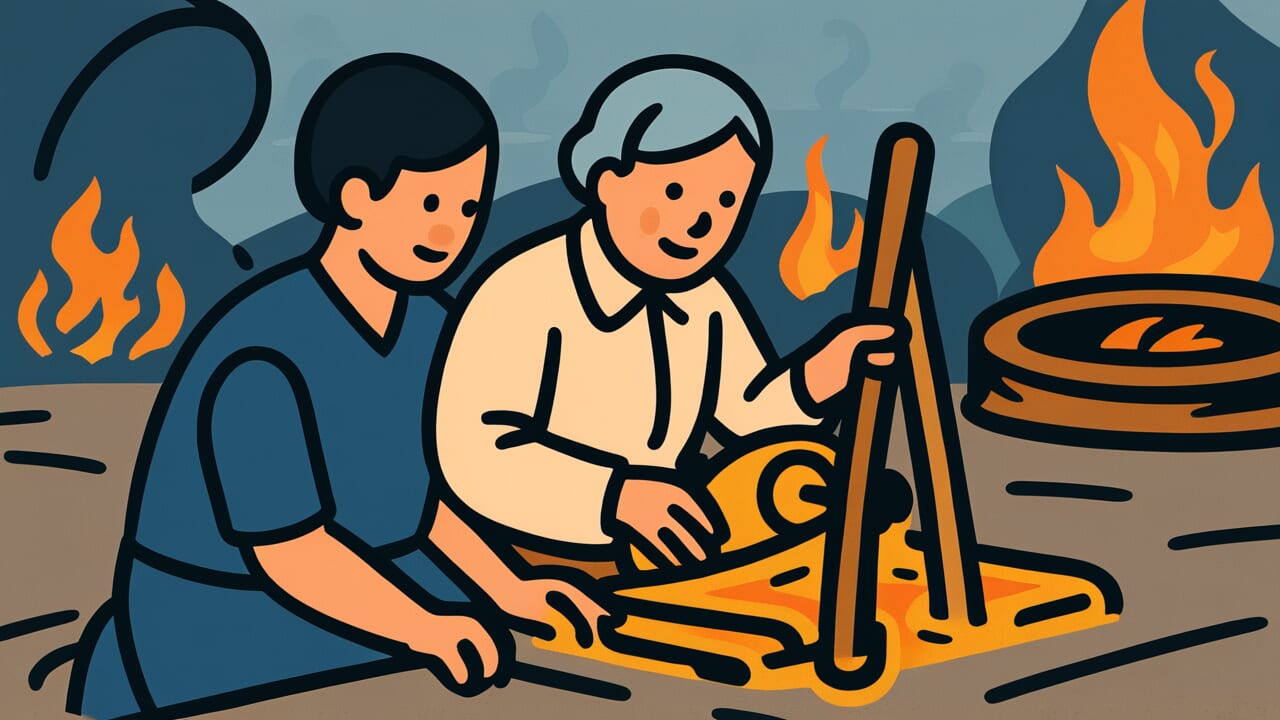How to Read “Filial piety and fire prevention should be done before turning to ashes”
おやこうこうとひのようじんははいにならぬまえ
Meaning of “Filial piety and fire prevention should be done before turning to ashes”
This proverb means that if you practice filial piety and fire prevention early, you won’t have regrets later.
Both become impossible to fix once it’s too late. The teaching reminds us never to neglect daily preparation and gratitude.
Filial piety should be practiced while your parents are still healthy and alive.
If you regret not being kinder after they’re gone, you can’t do anything about it anymore. Similarly, panicking after a fire starts is too late.
What matters is being careful with fire daily and staying prepared.
People use this proverb when encouraging someone who keeps postponing important things to take action now.
If you think “there’s still time” or “I can do it anytime,” you’ll realize it’s too late when you finally notice.
Even today, people use it to emphasize expressing gratitude to parents and maintaining daily safety practices.
Origin and Etymology
No clear written records document the origin of this proverb. However, the structure of the phrase offers interesting insights.
The distinctive feature is pairing two seemingly unrelated things: “filial piety” and “fire prevention.”
Filial piety is a moral act in human relationships. Fire prevention is a practical precaution in daily life.
This combination likely emerged from common people’s lives during the Edo period.
Japanese houses then were wooden structures, and fire was the most feared disaster.
There’s even a saying that “fires and fights are the flowers of Edo.” Fire was such a familiar threat.
Once flames spread, houses and possessions turned to ash in moments. Similarly, if you don’t honor your parents while they’re alive, regret after they die can’t undo anything.
The expression “before turning to ashes” is a clever metaphor.
It overlaps the image of a house burning to ash with only the ashes of regret remaining after losing parents.
Both convey the urgency of “before it’s too late.”
This proverb reflects ancestral wisdom that connected two vital aspects of daily life through the common image of fire: love for family and safety in living.
Usage Examples
- Filial piety and fire prevention should be done before turning to ashes, so I’ll visit my parents’ home this holiday while they’re still healthy
- I reminded my colleague who complained about fire drills that filial piety and fire prevention should be done before turning to ashes
Universal Wisdom
The universal truth this proverb speaks to involves two human essentials: the psychology of procrastination and the value we recognize only after loss.
We tend to assume that precious things will “always be there.”
Parents will stay healthy forever. A fire will never happen to us.
This baseless sense of security makes us postpone action. It’s also a psychological defense mechanism.
Constantly feeling anxiety and fear is painful, so we unconsciously try to believe “it’ll be fine.”
However, time flows mercilessly, and situations change moment by moment.
Parents inevitably age, and carelessness with fire suddenly causes disaster. Only after losing something do people realize its true value.
This proverb has been passed down through generations because this human nature never changes across time.
No matter how much science and technology advance, human life remains finite and accidents happen unexpectedly.
Our ancestors saw through this inherent human weakness. They embedded the message “cherish this very moment” into this proverb.
It teaches the nobility of taking action before only the ashes of regret remain.
When AI Hears This
The second law of thermodynamics teaches that everything in the universe moves one-way from order to disorder.
Milk poured into coffee mixes spontaneously but never separates back to its original state.
This proverb points out exactly this irreversibility in two domains: human relationships and fire.
What’s noteworthy is that both aging parents and fires represent the same physical process of entropy increase.
About 300 billion human cells replace themselves daily, but DNA replication errors accumulate continuously and biological system order gradually breaks down.
Fire works similarly. Wood, a low-entropy carbon compound, converts through combustion into carbon dioxide and ash, high-entropy states.
Both are thermodynamically phenomena where “usable order” transforms into “unusable disorder.”
More fascinating is how this proverb emphasizes time asymmetry through “before turning to ashes.”
Since entropy increases with time, we cannot return to the past.
Both filial piety and fire prevention become irreversible once timing is missed because they’re governed by thermodynamic time’s arrow.
In other words, this proverb brilliantly articulates in language the reality that physical laws impose constraints on human behavior.
Lessons for Today
What this proverb teaches modern people is the principle of action: “do what you can do now, now.”
Modern society has become convenient, and many things can be done “anytime.”
With smartphones, you can contact parents anytime. You can buy disaster supplies online instantly.
But hasn’t this convenience become an excuse for postponing action?
What matters is the courage to take that one step between what’s possible and what gets done.
Making one phone call to your parents, checking expiration dates on emergency supplies—small actions like these are enough.
You don’t need to aim for perfect filial piety or perfect disaster preparedness. Accumulating small things you can do today leads to a life without regrets.
Is there something in your heart you’re thinking “I’ll do someday”?
Is “someday” really okay for that? This proverb asks us this question.
Rather than regretting after things turn to ashes, there must be something you can start right this moment.
Not tomorrow but today—why not take action on even one thing?



Comments